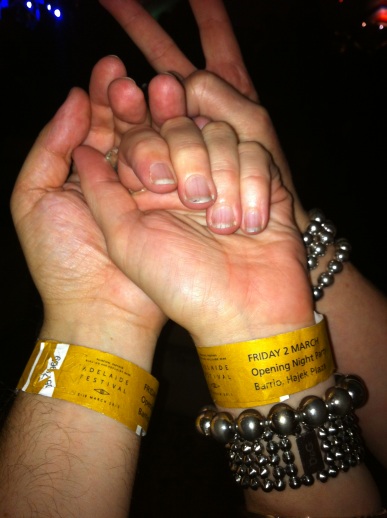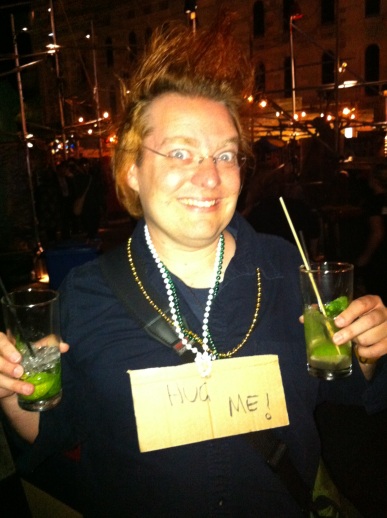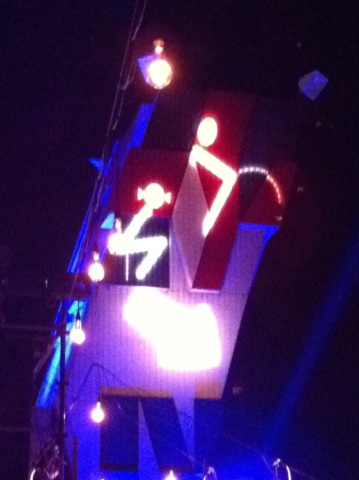[2012073] Ennio Morricone Live
Ennio Morricone, Adelaide Symphony Orchestra, Adelaide Festival Chorus @ Elder Park
7:30pm, Fri 2 Mar 2012
Right up front: this was one of the most glorious performances I’ve ever seen. Ever.
But so much of any discussion surrounding this event is going to be mired in negativity, because… well, because of scheduling. Because of expectations. Because of elitism and class warfare.
So let’s get the grief out of the way first.
As everyone in Adelaide knows, the third month of the year is colloquially known as Mad March – because most of the major events in the city all take place at the same time. Yes, there’s the Fringe and the Festival, but there’s also (amongst other things) the Clipsal 500 (a touring car race weekend) and, in more recent years, SoundWave (a touring music festival, whose 2013 lineup looks fantastic). The date for Ennio Morricone was announced prior to the Festival launch (sometime around August, if I recall correctly), but – after SoundWave settled on that same Saturday night for its Bonython Park metal-fest, the Festival Board leapt into action and brought Morricone forward a day.
In announcing the rescheduling of the event, a letter was sent out (sometime in November) to people who’d already bought tickets; the Festival’s Artistic Director, Paul Grabowsky, signed his name after the following statement: “We can’t afford to take any risks in the presentation of Ennio Morricone. This is a once in a lifetime experience for our audience and the sound quality must be of the highest level. As much for the sake of our distinguished artists as for our patrons, our standards cannot be compromised.”
Which, in retrospect, indicates that maybe, just maybe, someone didn’t check the city’s event calendar.
Because, when the ASO and a massive chorus fired up under Morricone’s direction, it was only a matter of minutes into the performance before the sounds of car racing on the other side of the city started seeping in.
Now, I saw the funny side of it. I smiled when the silver-tops directly in front of me tutted and harrumphed noisily, turning around to try and spy the aural incursion. I smiled when they shifted in their seats, seemingly seething in aged anger, as an ambulance tore down King William Road, siren blaring. I choked back a giggle as they pulled faces and pointed, enraged, at a plane flying overhead.
I found all that amusing because, clearly, some people had gone to an outdoor concert and expected pristine listening conditions. I, certainly, did not: I want to believe that I live in a living, breathing city, whose denizens are vibrant and able to create wonderful experiences… of which this concert was one. There is only so much of the city one can reasonably expect to control.
Which is why, during one of the softer closing pieces of the second bracket, I was the one who furiously seethed when some utter fuckwit in the Festival Centre allowed their staff to perform their bottle collection procedure, accompanied by a torrent of clanking and smashing of glass.
Because that act was under the reasonable purview of event management. And that act was worth getting upset over.
But there was precious little mention of that in the media. Instead, class warfare broke out in the comments on this Adelaide Now story after Clipsal patrons took umbrage to one of their races being cut short (allegedly due to a phone call from the Premier, who attended Morricone’s performance).
And, whilst I personally find car racing to be unattractive to the point of loathing, I can completely understand where those people are coming from. And, amidst their cultural ignorance, they do bring up some valid points: Clipsal is financially worth far more to the State than the Festival.
That doesn’t stop me becoming depressed over those comments, because this culture clash will inevitably continue for some time to come… and it feels like there are two warring factions that are completely unprepared to give an inch. And, of course, the biggest disgrace (from my point of view) was that Festival Centre cleanup crew…
But you know what? In retrospect, none of what I wrote above matters in the slightest. Because, under Morricone’s tutelage, the ASO and the Chorus created utterly spellbinding renditions of the conductor’s compositions. The pieces that were intimately familiar to me (the soft and sad lullaby of The Sicilian Clan, and the pulsing noir of Investigation of a Citizen Above Suspicion) were mesmerising, and the less familiar pieces – most notably the spaghetti western scores – were a joy to drink in. My pleasure was undoubtedly buoyed by our proximity to the stage – our seats were in prime position, and my trusty opera glasses had me watching Morricone’s movements (and the response of the ensemble) like a hawk.
By the end of the programme, I was thrilled – clanking of glass aside, I’d really enjoyed myself. But then came the encores…
Oh. My. God.
There’s a couple of aural ticks that I find emotionally overwhelming: power and depth of sound. Interweaving vocal lines. Bold string notes. And as Morricone kept returning to the stage, to conduct encore after encore, these ticks became more and more evident: and, I swear, that final piece was written, conducted, and performed just for me. A wall of sound, a choral tidal wave, swelling strings…
And all of a sudden I was on my feet. I had to stand and applaud; it seemed utterly inconceivable to me that I could do otherwise. With joyful tears streaming down, breath juddering from weeping, four times I stood and raised my hands in the air, applauding all who created that experience for me.
That was the first time I’ve given anything a standing ovation. There were some acts in the past that, in retrospect, I felt a little guilty about not having contributed to a Standing O, but… now I know what it feels like. To feel utterly compelled to show my appreciation.
And, as we joined the stream of people leaving Elder Park, my Event Buddy gave me a moment to clean myself up; to mop up those distilled tears of joy. “So,” she eventually said, “you enjoyed it?”
All I could do is burst into another happy fit of weeping. And it seems odd that the strongest memories of that magical performance would be of the tears – but I can still feel them now, hot and delicious and uncontrolled and glorious. And they remind me of that sound – not of cars or bottles or sirens or airplanes, but of strings and voices and wind, all controlled by the tiny baton held by a diminutive Italian man.
Magical.


